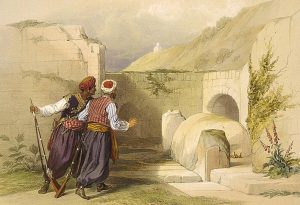The main difference between a sabbatical year (‘Shemitah’{שמיטה}) and the jubilee (‘Yovel’{יובל}) is the issue of the property ownership.
While in the sabbatical year the fruits of one’s field are FREE to use for anyone but one still OWNS the field, at the jubilee the ownership of the field itself is subject to changes.
Let’s have a look at what the Bible says about this issue:
“And you shall consecrate the fiftieth year, and proclaim liberty throughout the land to all its inhabitants. It shall be a jubilee for you, when each of you shall return to his property and each of you shall return to his clan.” (Leviticus 25:10)
In the original Hebrew the word for ‘property’ is ‘Achuzah’ {אחוזה} and it is derived from the Hebrew root A-CH-Z {א-ח-ז} which means ‘to hold’ or ‘holdings.’ This Hebrew word – ‘Achuzah’ – has a more deeper layered meaning than simply ‘property.’ In fact, every time the Hebrew Bible uses this specific word it means that we are talking about a property which belongs to its owner by law – either divine or human law.
For example, that is the case in the description of Abraham’s request to purchase a burial place for his wife Sarah, as can be found in Genesis:
“I am a sojourner and foreigner among you; give me PROPERTY among you for a burying place, that I may bury my dead out of my sight.” (Genesis 23:4)

And now we can better understand the opening statement of Abraham: because he is ‘a sojourner and foreigner’ he did not have ownership of any property (piece of land) where he lived. Abraham did not just buy a property for now but rather a property that would belong to him and his descendants FOREVER. In other words, he ‘holds’ the legal rights for this piece of land. And we see this legal right in action in the burial of his grandson – Jacob:
“For his sons carried him to the land of Canaan and buried him in the cave of the field at Machpelah, to the east of Mamre, which Abraham bought with the field from Ephron the Hittite to possess as a burying place.” (Genesis 50:13)
There, in the original Hebrew the phrase ‘to possess as a burying place ‘ appears as ‘Achuzaht Kever’{אחוזת קבר} (‘Kever’ {קבר} means ‘grave’ in Hebrew). When the Bible uses this specific Hebrew word, it means that Abraham bought this property from its LEGAL owner – Ephron the Hittite, in this case.
That is why it is no surprise to discover exactly the same Hebrew word in the following verse from the Book of Joshua: “But now, if the land of your possession is unclean, pass over into the LORD’s land where the LORD’s tabernacle stands, and take for yourselves a possession among us.” (Joshua 22:19)
There ‘the LORD’s land’ is ‘Eretz Achuzat Adonai’ {ארץ אחוזת אדוני} in the original Hebrew and God promised it to Abraham: “And I will give to you and to your offspring after you the land of your sojournings, all the land of Canaan, for an everlasting possession, and I will be their God.” (Genesis 17:8) ‘For an everlasting possession’ appears in the original Hebrew as ‘La-Achuzat Olam’ {לאחוזת עולם} (‘Olam’ {עולם} means ‘forever’ in this context, literally means ‘world’).
This means that the people of Israel received the legal rights ‘to hold’ the land of Canaan. So when the Bible uses this Hebrew word -‘Achuzah’ – in the context of jubilee it means that the property (land) shall return to its rightful owner –either by human or divine law – and not simply the previous owner.
